Ashley, es una mujer comprometida con la rehabilitación de mujeres privadas de libertad de una forma dinámica y llena de amor. Cuando tenía 18 años llegó desde Tennesse a Guatemala, impulsada por la curiosidad de conocer a un niño que apadrinaba. Al conocer al pequeño, su vida cambio, y desde entonces se sintió identificada con él y con Guatemala. Su trayectoria inició como voluntaria en el mismo orfanato. Allí empezó a conocer las injusticias del sistema que perpetúan el ciclo de pobreza y luego de violencia.
Ashley Williams, Johana Bahamón y Saskia Niño de Rivera. Justicia por la Libertad
PIA BONILLA

- SHE AND SHE, presents a new space, in which the actions of true female influences will be the protagonists, defending human rights through the investigation and voice of Pía Bonilla.
In this great beginning we immerse ourselves in such difficult and harsh realities as the prisons of South America through the work and history of three incredible women; Ashley Williams, Johana Bahamon and Saskia Niño de Rivera. Each one of them leaves fear behind by taking a step forward every day to change the prison and judicial systems in Guatemala, Colombia and Mexico.
There are no more influential people than those who fight to make this world a better place for all who live in it.
SHE AND SHE, presenta un nuevo espacio, en el cual las acciones de influencias femeninas reales serán las protagonistas, defendiendo los derechos humanos a través de la investigación y voz de Pía Bonilla.
En este gran comienzo nos sumergimos en realidades tan difíciles y duras como son las cárceles de Sudamérica a través del trabajo e historia de tres increíbles mujeres; Ashley Williams, Johana Bahamón y Saskia Niño de Rivera. Cada una de ellas deja el miedo atrás dando todos los días un paso al frente para cambiar el sistema penitenciario y judicial en Guatemala, Colombia y México.
No existen personas más influyentes que las que luchan por hacer de este mundo, un lugar mejor para quienes vivimos en él.
ASHLEY WILLIAMS (GUATEMALA)
ASHLEY WILLIAMS (GUATEMALA)
- Ashley is a woman committed to the rehabilitation of women deprived of liberty in a dynamic and loving way. When she was 18 years old, she came to Guatemala from Tennessee, driven by curiosity to meet a child she sponsored. When she met the little boy, her life changed, and from then on she felt identified with him and with Guatemala. Her career began as a volunteer in the same orphanage. There she began to learn about the injustices of the system that perpetuate the cycle of poverty and violence.

“Lo que más me apasiona del servicio es que puedo ser la voz de quienes no son escuchados”, nos cuenta Ashley.
“What I am most passionate about this service is that I can be the voice of those who are not heard,” says Ashley.
Ella recuerda que una de las razones por las que se acercó aún más a la realidad de pobreza fue cuando llegó Ana al hogar, una niña de once años que había sido abusada por su mamá. Ana venia de un barrio llamado la Limonada, el mismo del que provenían la mayoría de niños/as con problemas. Un día Ashley decidió ir sola a caminar por la Limonada. Debo contar que Ashley no hablaba nada de español y apenas llevaba algo de dinero, pero mientras caminaba, empezó a sentir algo extraño dentro de su alma, se sintió feliz de estar caminando en esas calles, y sintió la necesidad de hacer algo para ayudar a cambiar ese mundo de una forma positiva, y ahí fue donde encontró su camino, su propósito de vida. Todas las dudas que tenía sobre su futuro iban desapareciendo con cada paso que daba, en ese ambiente hostil, donde se respira lucha. En unas pocas horas había vivido más emociones que en toda su vida.
She recalls that one of the reasons she got even closer to the reality of poverty was when Ana came home, an eleven-year-old girl who had been abused by her mother. Ana came from a neighborhood called La Limonada, the same neighborhood where most of the children with problems came from. One day Ashley decided to go for a walk alone in La Limonada. I must say that Ashley did not speak any Spanish and she barely had some money, but as she walked, she began to feel something strange inside her soul, she felt happy to be walking in those streets, and she felt the need to do something to help change that world in a positive way, and that’s where she found her way, her life’s purpose. All the doubts she had about her future were disappearing with each step she took, in that hostile environment, where fighting is a necessary part of it. In a few hours she had experienced more emotions than in her entire life.

«Encontré lo que quiero hacer el resto de mi vida y mi lugar está aquí». ¿Les parece una locura? Tal vez, pero mejor vivir una locura en el lugar que creía que debía estar que arrepentirse de no hacerlo, así que la apoyaron.
«I found what I want to do for the rest of my life and my place is here.» Sound crazy? Maybe, but better to live crazy in the place where she thought she should be than to regret not doing it, so they supported her.
La señal de ese día fue tan fuerte que llamó a sus padres ese momento y les dijo: «Encontré lo que quiero hacer el resto de mi vida y mi lugar está aquí». ¿Les parece una locura? Tal vez, pero mejor vivir una locura en el lugar que creía que debía estar que arrepentirse de no hacerlo, así que la apoyaron. Poco tiempo después se mudó a la Limonada, este asentamiento ubicado en la zona 5 de Guatemala, catalogado por las autoridades como “zona roja” por su alto nivel de riesgo, fue el lugar donde Ashley aprendió español, hizo muchos amigos y empezó su camino.
Ashley se fue a vivir a la Limonada porque para empezar a resolver los problemas de ese mundo, antes debía conocer las causas de toda esa miseria, de la violencia, de la razón por la que el crimen era una necesidad para sobrevivir.
The signal for that day was so strong that she called her parents at that time and said, «I found what I want to do for the rest of my life and my place is here.» Sound crazy? Maybe, but better to live crazy in the place where she thought she should be than to regret not doing it, so they supported her. Shortly after she moved to La Limonada, this settlement located in zone 5 of Guatemala, classified by the authorities as a «red zone» due to its high level of risk, was the place where Ashley learned Spanish, made many friends and began her journey.
Ashley went to live in La Limonada because to begin to solve the problems of that world, first she had to know the causes of all that misery, of all that violence, of the reason why crime was a necessity to survive.
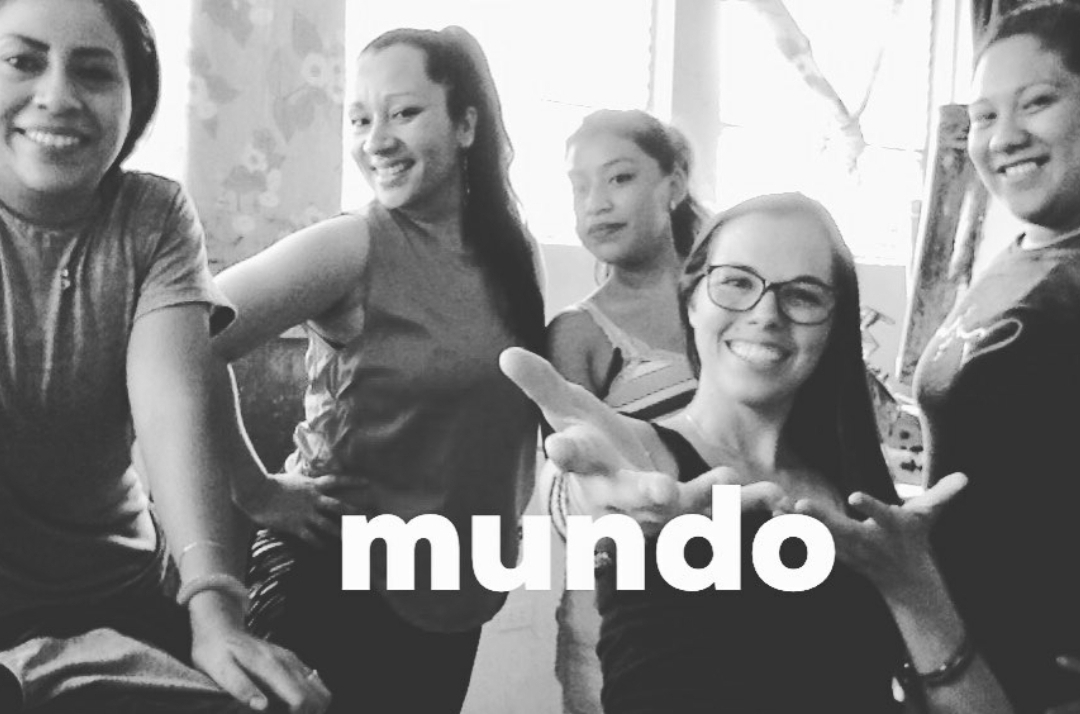
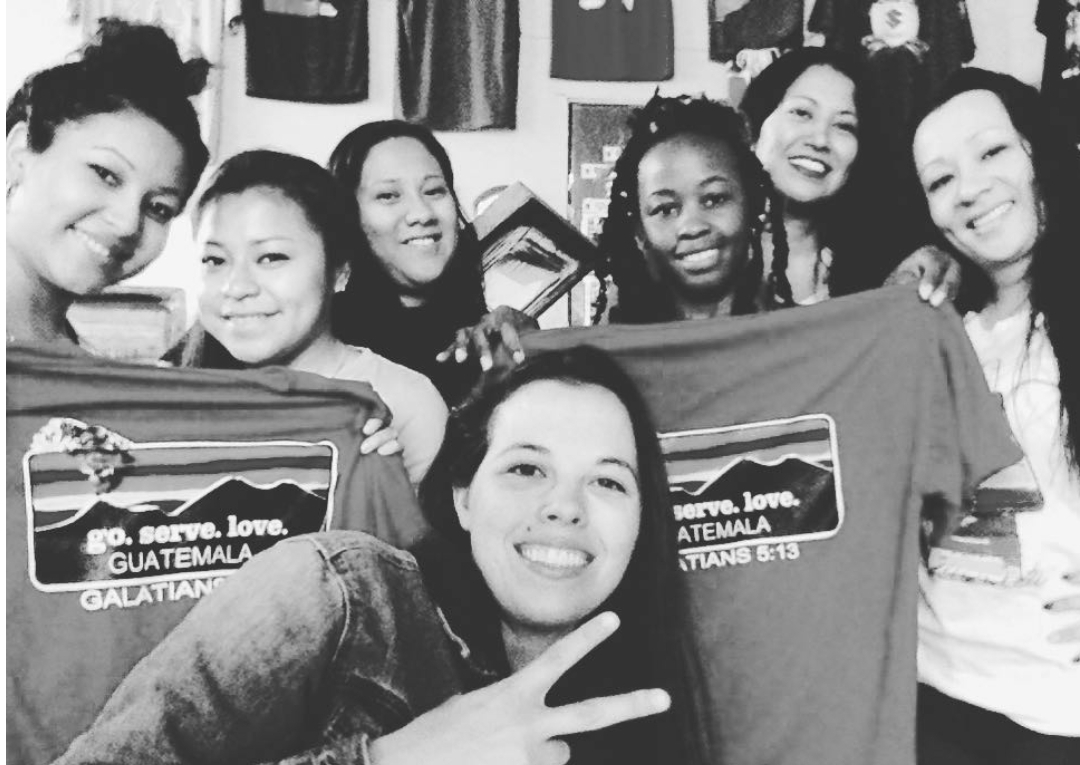
Ashley se ganó la confianza y protección de algunos de los pandilleros más peligrosos de la Limonada y su panadería es un éxito. Su visión de crear un cambio sostenible se basa en no regalar nada sino enseñar cómo ganarse la vida de forma honesta
Ashley has earned the trust and protection of some of the most dangerous gang members in la Limonada, and her bakery is a success. Her vision of creating sustainable change is based on not giving anything away but teaching how to earn an honest living
Hay muchas razones del porqué de la violencia, a veces, es el único camino, una de ellas es que no existían fuentes de trabajo y para empezar a solucionar ese problema emprendió el reto de iniciar una organización llamada Hope Renew que brinda trabajo y recolecta apoyo financiero en el extranjero para apoyar la educación de personas de la Limonada. Con el respaldo de su familia arrancó el proyecto de una panadería, que fue un éxito desde el inicio. Contrató a varias personas que estaban desempleadas y le ha financiado la educación a muchos jóvenes de esa zona. Con todo esto, Ashley se ganó la confianza y protección de algunos de los pandilleros más peligrosos de la Limonada y su panadería es un éxito. Su visión de crear un cambio sostenible se basa en no regalar nada sino enseñar cómo ganarse la vida de forma honesta, en un lugar donde esa es la forma más difícil de lograrlo.
There are many reasons why violence, sometimes, it is the only way, one of them is that there were no sources of work and to begin to solve that problem, she undertook the challenge of starting a organization called Hope Renew that provides work and collects financial support abroad to support the education of people from La Limonada. With the support of her family, she started a bakery project, which was a success from the beginning. She hired several people who were unemployed and she financed the education of many young people in that area. With all of this, Ashley has earned the trust and protection of some of the most dangerous gang members in la Limonada, and her bakery is a success. Her vision of creating sustainable change is based on not giving anything away but teaching how to earn an honest living, in a place where that is the most difficult way to achieve it.
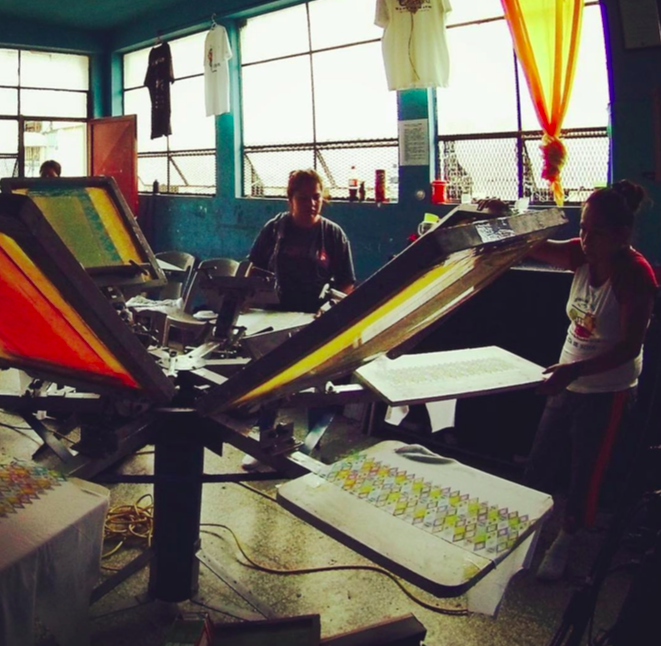
Dieciséis años después, ahora tiene una fundación “Serigrafía de la Gringa”, que vende bolsas, mochilas, mascarillas re-utilizables, camisetas, chalecos, uniformes y gorras hechos por personas privadas de libertad que están trabajando en ser mejores personas por medio de la confección de prendas que crean un impacto y desarrollo sostenible en Guatemala.
Sixteen years later, she now has a foundation «Serigrafia de la gringa» that sells bags, backpacks, reusable masks, T-shirts, vests, uniforms and caps made by people deprived of liberty who are working to improve themselves through making garments that create an impact and sustainable development in Guatemala.
Una vez inmersa en ese mundo conoció otra realidad que muchos no conocemos y que nos es muy lejana a nuestra realidad, el sistema penitenciario. Muchas personas que Ashley conoció en este barrio estaban en las cárceles locales. A veces por razones fundamentadas y muchas otras no. En un inicio, Ashley comenzó a ir a la cárcel como voluntaria para realizar manualidades y pasar el tiempo con algunas reclusas. Dieciséis años después, ahora tiene una fundación “Serigrafía de la Gringa”, que vende bolsas, mochilas, mascarillas re-utilizables, camisetas, chalecos, uniformes y gorras hechos por personas privadas de libertad que están trabajando en ser mejores personas por medio de la confección de prendas que crean un impacto y desarrollo sostenible en Guatemala.
Con este emprendimiento, se ha ganado una excelente reputación y se beneficia del apoyo continuo de asociaciones públicas y privadas como los Ministerios de Educación, Gobernanza y Economía de Guatemala y varias empresas nacionales e internacionales.
Ashley es una mujer que ha dedicado su vida a contribuir con la rehabilitación de un sector de la población que la mayoría no conoce y que se niega siquiera a escuchar sus historias. Yo la admiro por todo lo que hace y por darle voz a quienes no la tienen en este mundo.
Once immersed in that world, she met another reality that many of us do not know and that is very far from our reality, the prison system. Many people Ashley met in this neighborhood were in local jails. Sometimes for well-founded reasons and many others not. Initially, Ashley began volunteering in jail to do crafts and hang out with some inmates. Sixteen years later, she now has a foundation «Serigrafia de la gringa» that sells bags, backpacks, reusable masks, T-shirts, vests, uniforms and caps made by people deprived of liberty who are working to improve themselves through making garments that create an impact and sustainable development in Guatemala. With this undertaking, she has earned an excellent reputation and benefits from the continuous support of public and private associations such as the Ministries of Education, Governance and Economy of Guatemala and several national and international companies. Ashley is a woman who has dedicated her life to contributing to the rehabilitation of a sector of the population that most do not know and who refuses even to listen to their stories.
I admire her for everything she does and for giving a voice to those who don’t have it in this world.
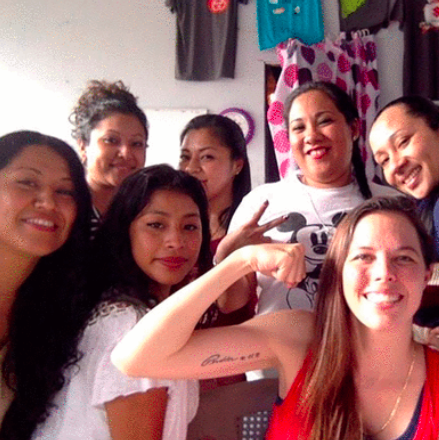
“El crimen y la delincuencia son frutos de un ciclo de injusticia”.- Ashley Williams.
«Crime and delinquency is the result of a cycle of injustice» .- Ashley Williams.
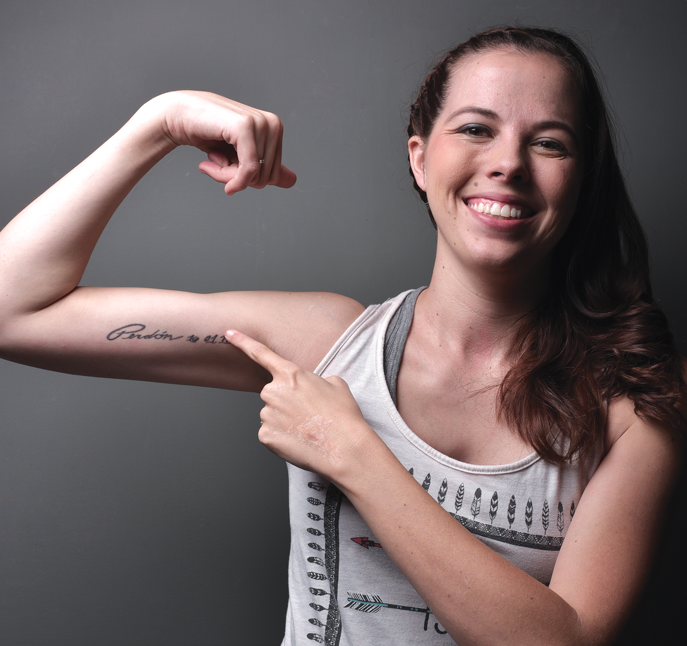
JOHANA BAHAMON (COLOMBIA)
JOHANA BAHAMON (COLOMBIA)
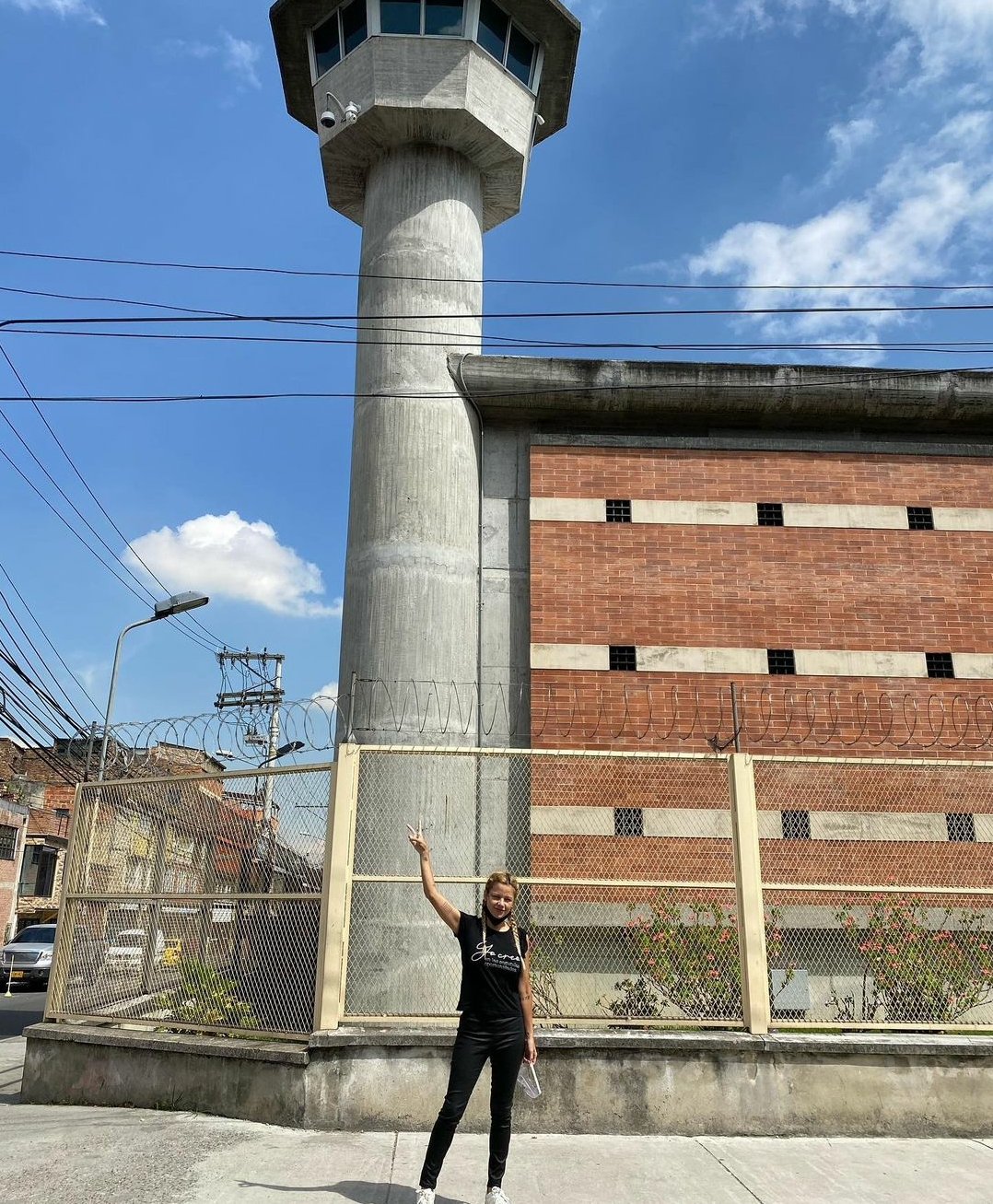
“Lo que más valoro es la libertad. Siento que hay muchas personas que están hoy dentro de la cárcel y son más libres que muchos de los que estamos afuera. Y eso es lo que les fomentamos que sean libres de espíritu, de pensamiento, de creatividad. Tienen muchas formas de libertad, la única que tienen restringida es la física. Algunos estamos afuera en una cárcel mental, cada uno en su encierro, criticando, juzgando, en sus problemas y en no ver más allá, y eso es lo que a nosotros nos transforma, nos hace valorar cada cosa íntima porque conocemos el otro lado.”- Johana B.
“What I value the most is freedom. I feel that there are many people who are in prison today and they are freer than many of us outside. And that is what we encourage them to be free of spirit, of thought, of creativity. They have many forms of freedom, the only one that is restricted is physics. Some of us are outside in a mental prison, each one in his confinement, criticizing, judging, in their problems and in not seeing beyond, and that is what transforms us, makes us value each intimate thing because we know the other side”- Johana
La vida de Johana cambió hace nueve años cuando era actriz y fue a la cárcel de mujeres de Bogotá a ser jurado en un reinado de reclusas. Ese día, Johana le preguntó a una mujer por qué estaba en la cárcel. Ella le dijo: “Porque maté a mi marido”. En ese momento a Johana se le cruzaron miles de cosas por la cabeza, pero más tarde volvió a preguntarle por qué lo había matado, y ella le respondió: “Porque lo encontré violando a mi hijo de tres años”. Johana volvió a tener muchos pensamientos, pero esta vez fue distinto. Sin juzgarla y sin justificarla pudo entender lo que esa mujer había vivido y la razón por la que estaba en la cárcel.
Johana’s life changed nine years ago when she was an actress and she went to the Bogotá women’s prison to be a jury in a beauty contest of inmates. That day, Johana asked a woman why she was in prison. She told her: «because I killed my husband.» At that moment, thousands of things crossed Johana’s mind, but later she asked her again why she had killed him, and the inmate replied: «Because I found him raping my three-year-old son.» Johana had many thoughts again, but this time it was different. Without judging her and without justifying her, she was able to understand what that woman had lived through and why she was in prison.
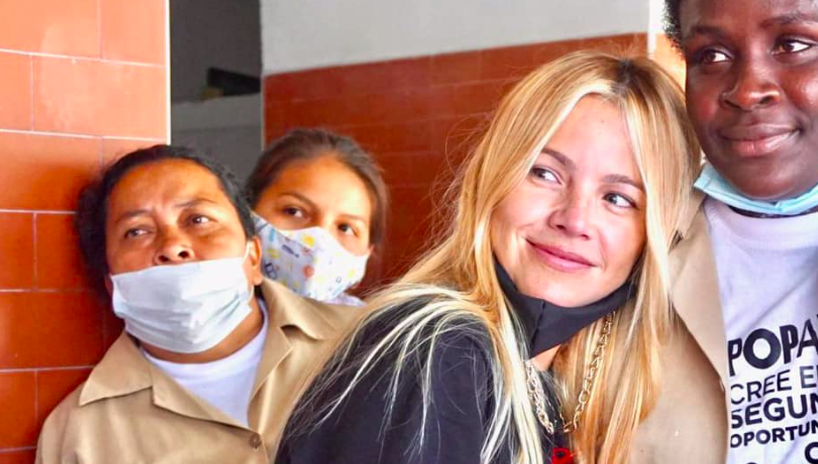
“Desde el primer día que fui a la cárcel, para mí fue imposible ser indiferente a esa realidad que pude ver, y sobre todo a los seres humanos que conocí, a sus historias, sus vidas. Eso me hizo verlos desde el primer día como seres humanos, como lo que son, porque todos hemos cometido errores, todos hemos pedido segundas oportunidades, a la gran mayoría nos han dado segundas oportunidades, y tenemos que empezar nosotros a darlas”- Johana B.
“From the first day I went to prison, it was impossible for me to be indifferent to that reality that I could see, and especially to the human beings that I met, their stories, their lives. That made me see them from day one as human beings, for what they are, because we have all made mistakes, we have all asked for second chances, the vast majority have been given second chances, and we have to start giving them” adds Johana.
Desde ese día ella canceló todo para estar en la cárcel. Entonces, decidió hacer una obra de teatro con las mujeres de la cárcel, porque esa era su herramienta de trabajo en ese momento. Le presentaron la propuesta a la directora de la cárcel, ella la aceptó y el proyecto se puso en marcha. En el proceso de montaje de la obra, Johanna tuvo la oportunidad de conocer realmente el día a día de ese lugar, qué les gustaba, qué pensaban ellas. “Noté que las doce mujeres con las que armé la obra estaban transformadas. Les brillaban los ojos porque veían una esperanza”. Declaro Johana a la Revista Semana.
From that day on, she canceled everything to be active within the prison. She decided to do a theater play with the inmates , that was her working tool at the time. They presented the proposal to the director of the prison, Johana accepted it and the project got underway. In the process of staging the play, Johanna had the opportunity to really know the day-to-day life of that place, what they liked, what they wanted. “I noticed that the twelve women with whom were part of the play were transformed. Their eyes shone because they saw hope ”. Johana declared to Semana Magazine.
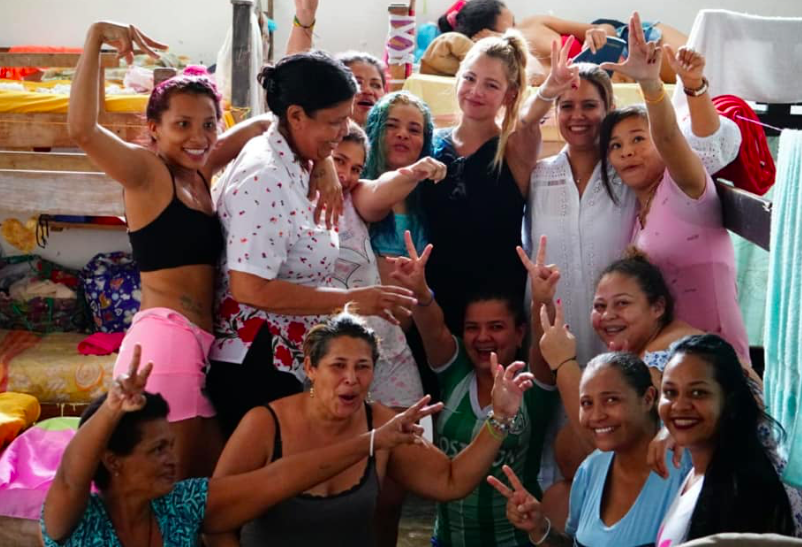
«Mi vida cambió absolutamente desde hace nueve años. Sentí la necesidad de devolverle a la vida lo generosa que ha sido conmigo y tuve la oportunidad de conocer una cárcel, de estar en una. Todos sabemos cómo son, pero una cosa muy diferente es estar adentro y ver realmente lo que pasa ahí, cómo duermen, qué comen y sobre todo conocer a esos seres humanos allá adentro. Me di cuenta de que uno puede estar privado de su libertad, pero eso no significa que deba privarse de su dignidad”- Johanna B.
«My life changed absolutely nine years ago. I felt the need to give back to life how generous it has been with me and I had the opportunity to visit a prison, to be in one. We all know what they are like, but a very different thing is to be inside and really see what happens there, how they sleep, what they eat and above all meet those human beings there. I realized that one can be deprived of their freedom, but that does not mean that they should deprive themselves of their dignity «- Johanna said.
Después de la obra de teatro, decidió dedicarse definitivamente a las cárceles. Hasta hoy ha trabajado en 30 prisiones con tres líneas de acción: la primera es crecimiento interno, apoyo y rehabilitación de adicciones y apoyo psicosocial.
La segunda es teatro interno que es resocialización por medio del arte y la cultura.
El tercero es el restaurante Interno que funciona en la cárcel de mujeres de Cartagena y busca que las cárceles sean centros productivos. El restaurante abre todas las noches al público para que haya un espacio de reconciliación. Debo decir que el Restaurante Interno es el primero en el mundo en ser atendido por la población carcelaria femenina. Hasta ahora han ido más de 9.000 personas.
After the play, she decided to dedicate herself permanently to the working with the prison system. To date, she has worked in 30 prisons with three lines of action: the first is internal growth, addiction assistance, rehabilitation, and psychosocial support.
The second consists of the use of theater as a mean toward socialization through art and culture.
The third is the Internal restaurant that operates in the women’s prison in Cartagena and seeks to make out of the prisons productive centers. The restaurant is open to the public every night so that there is a space for reconciliation. I must say that the Internal Restaurant is the first in the world to be served by the female prison population. So far more than 9,000 people have attended.
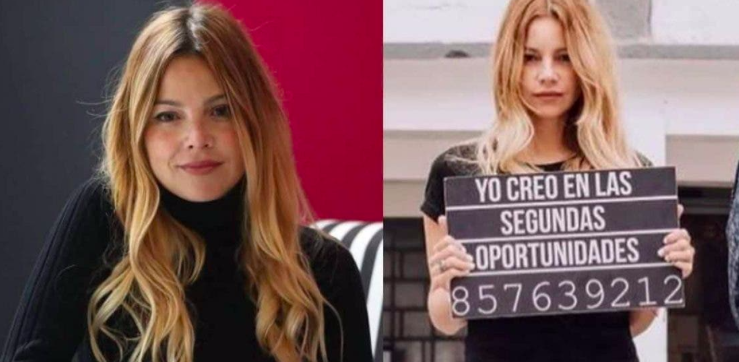
“La reinserción laboral y social debe ser digna, como se lo merecen ellos, porque ya cumplieron su deuda con la sociedad y ahora necesitan la ayuda de las personas que estamos aquí afuera, al otro lado. Lo primero que les piden en un empleo es el pasado judicial. Sin empleo es difícil para ellas rehacer su vida”. –Johana B.
“The labor and social reintegration must be dignified, as they deserve it, because they have already fulfilled their debt to society and now they need the help of the people who are out here, on the other side. The first thing they ask when applying for a job is their past history. Without a job it is difficult for them to rebuild their lives ”. -Johana.
A la fecha, la fundación “Acción Interna” ha trabajado en 31 cárceles de Colombia, y con sus programas se han beneficiado más de 40.000 personas privadas de la libertad y cerca de 2.000 que ya la recuperaron.
En el 2020 Johana abrió un nuevo espacio de oportunidad para las personas que han cumplido su condena y junto a aliados como el Ministerio de Justicia, el Inpec y Colsubsidio crearon la Casa libertad, donde reciben a quienes cumplieron su condena para generarles oportunidades de empleo.
To date, the Fundación Acción Interna has worked in 31 prisons in Colombia, and its programs have benefited more than 40 thousand people deprived of liberty and about two thousand who have already recovered it.
In 2020 Johana opened a new space of opportunity for people who have served their sentence and together with allies such as the Ministry of Justice, Inpec and Colsubsidio created the Casa Libertad, where they receive those who have served their sentence in order to provide them with employment opportunities.
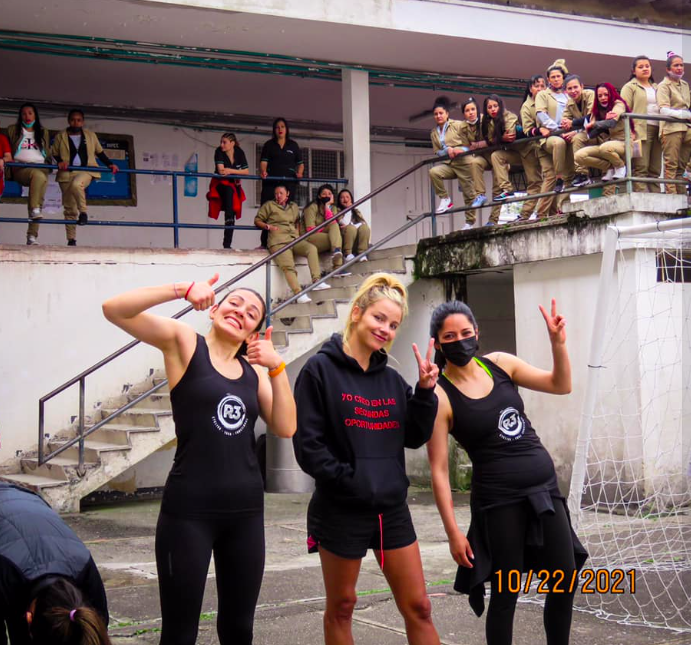
“Las personas privadas de la libertad me han enseñado a convertir errores en oportunidades, a creer en las segundas oportunidades, porque todos hemos cometido errores, y hemos querido o pedido segundas oportunidades. A mi me han dado segundas oportunidades toda la vida”.-Johana B.
“People deprived of liberty have taught me to turn mistakes into opportunities, to believe in second chances, because we have all made mistakes, and we have wanted or asked for second chances. They have given me second chances all my life «.- Johana.
Otro gran avance que ha hecho Johana junto a congresistas de todas las bancadas de Colombia es que se radicó el proyecto de ley Johana Bahamón: Segundas Oportunidades, que busca promover la reinserción laboral de personas que estuvieron privadas su libertad, generando beneficios tributarios y económicos a empresas que contraten personas en dicha condición.
A mi Johana me ha inspirado muchísimo y sobre todo me abrió más el corazón porque ahora, no solo no juzgo a nadie, sino que siento mucha más empatía por todas las personas que viven en una cárcel. Su trabajo en las cárceles le puso el foco a una población olvidada y estigmatizada que, a pesar de haber cometido errores, viven en medio de una dura vulneración de derechos.
Another great advance that Johana has made together with congressmen from all the banks of Colombia is the Johana Bahamón Bill : Second Opportunities , which seeks to promote the labor reintegration of people who were deprived of their liberty, generating taxes and economic benefits to companies that hire people in this condition.
Johana has inspired me a lot and above all it has opened my heart even more because now, not only do I not judge anyone but I feel much more empathy for all the people who live in prison. Her work in prisons focused on a forgotten and stigmatized population that, despite having made mistakes, live in the midst of a harsh violation of rights.
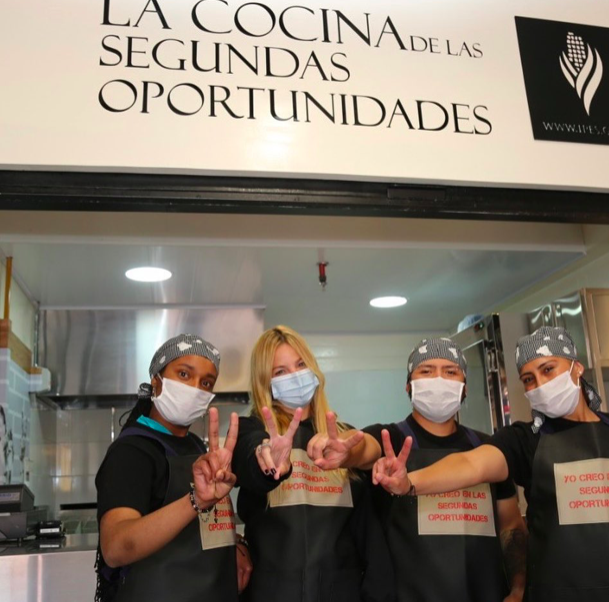
“Creo que todos tenemos ese derecho porque a todos nos pasa, todos cometemos errores, pero no todos tienen la grandeza de convertir ese error en oportunidad. Por eso valoro, admiro, respeto y defiendo a las personas privadas de la libertad”. – Johana B
“I think we all have that right because it happens to all of us, all of us who make mistakes, but not everyone has the greatness to turn that mistake into an opportunity. That is why I value, admire, respect and defend people deprived of their liberty ”. – Johana
SASKIA NIÑO DE RIVERA (MÉXICO)
SASKIA NIÑO DE RIVERA (MÉXICO)
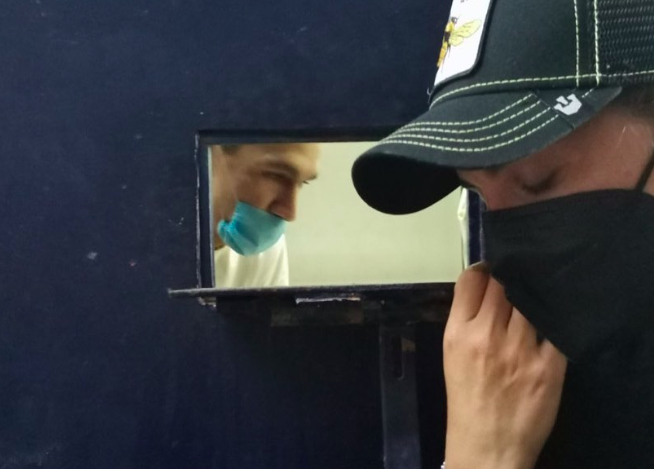
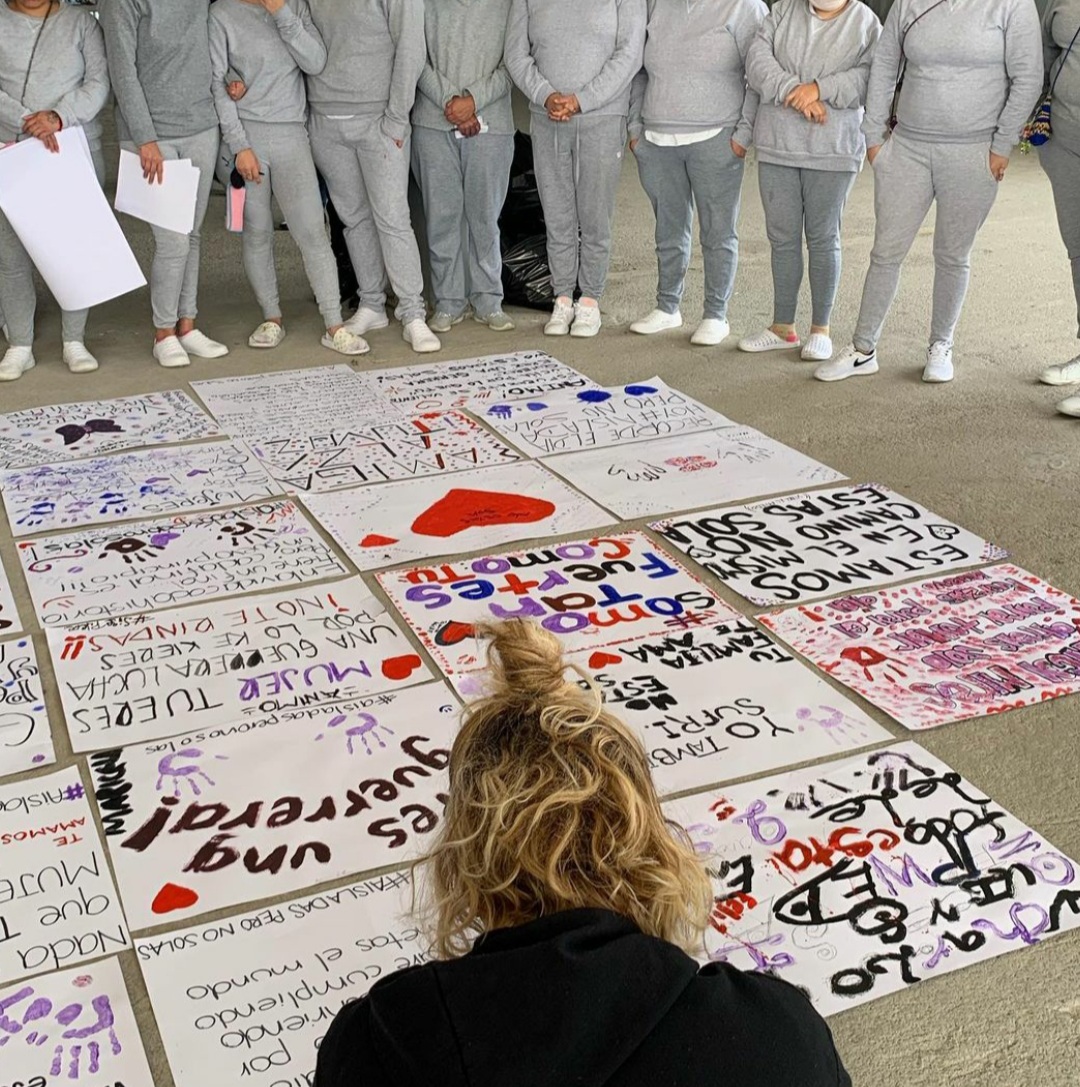
Saskia nació en una familia donde tuvo todo lo necesario; sus padres siempre han sido un gran apoyo y le brindaron las herramientas para entender que vivir sirviendo a una noble causa es suficiente. Desde muy pequeña se involucró en cuestiones sociales que la llevaron a encontrar su camino con proyectos que ayuden a cambiar vidas y crear un mundo mejor.
Cuando tenia 17 años vivió el secuestro de un familiar, y eso fue lo que le cambió la vida pues le llevo a cuestionarse; ¿Qué es lo que lleva a alguien a secuestrar a otra persona? Desde ahí, ella encontró en la falta de oportunidades y la re-inserción social la causa de los problemas de México.
Saskia tiene una trayectoria que va desde haber recorrido prácticamente todos los reclusorios de allí y elaborar los perfiles de más de 800 secuestradores, a crear una ONG “reinserta”, que apoya a las mujeres e hijos privados de su libertad.
Saskia was born into a family where she had everything she needed; her parents have always been very supportive and gave her the tools to understand that living serving a noble cause is enough. From a very young age, she was involved in social issues that led her to find her way with projects that help change lives and create a better world.
When she was 17 years old, she experienced the kidnapping of a relative, and that was what changed her life as it led her to question herself; What is it that leads someone to kidnap another person? From there, she found the lack of opportunities and social reintegration the cause of Mexico’s problems.
Saskia has a trajectory that goes from having visited practically all the prisons there and researching the profiles of more than 800 kidnappers, to creating her foundation, Reinserta, which supports women and children deprived of liberty.
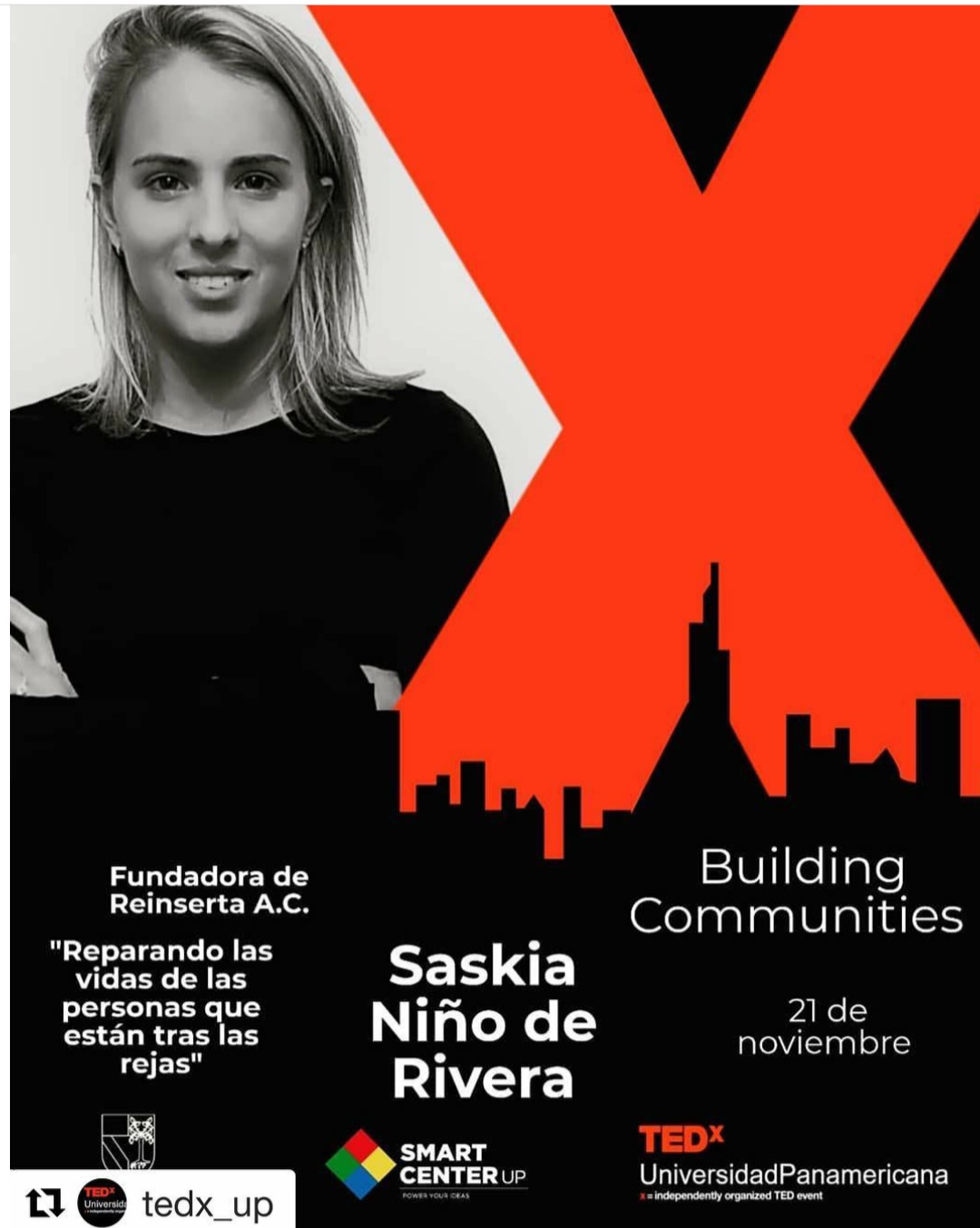
“Tenemos un caso muy especial: el esposo intentó violar a su hija más chiquita y ahí fue cuando la señora lo mató. Actualmente purga una condena de 50 años de cárcel. Los jueces hoy en día no sentencian con manera de género, no ven la perspectiva. Algunas se robaron un litro de leche, jamón, huevos y queso y tienen ocho años de sentencia con cuatro hijos chiquitos; en ningún momento estoy diciendo que no deben ser castigadas por cometer un delito, por supuesto que sí, pero hay que tener en cuenta las circunstancias”.- Declaro Saskia a R.S.V.P magazine.
“We have a very special case: the husband tried to rape her youngest daughter and that’s when the woman killed him. She is currently serving a 50-year prison sentence. Judges nowadays do not sentence in a gender way, they do not see the perspective. Some stole a liter of milk, ham, eggs and cheese and have an eight-year sentence with four young children; at no time am I saying that they should not be punished for committing a crime, of course they are, but the circumstances must be taken into account. ”- Saskia declared to R.S.V.P online magazine.
Saskia menciona que cada persona merece una oportunidad, siempre y cuando quieran tenerla, y que gracias a todas las personas que se han cruzado por su camino hoy ella es quien es. La primera vez que visitó una cárcel fue durante su servicio social, ahí se dio cuenta de la problemática social que existe en México.
Desde muy chica le interesaban los temas de criminología y justicia, y eso la llevó a especializarse en secuestro y asuntos penitenciarios en el Instituto Nacional de Ciencias Penales, también trabajó en negociación de secuestros en el Carstens Institute of Criminology, en Arizona.
A partir de ahí se preguntó de qué manera podía ayudar y hacer un cambio real en las cárceles de México. Tenía varias opciones como la de trabajar directamente en el gobierno, pero lo descartó porque sabía que el sistema penitenciario era totalmente corrupto, por lo tanto a los 24 años decidió crear Reinserta.
Saskia mentions that each person deserves an opportunity, as long as they want to have it, and that thanks all the people who have crossed her path today because she is who she is thanks to them. The first time she visited a prison was during her social service, there she became aware of the social problems that exist in Mexico.
From a very young age she was interested in the topics of criminology and justice, and that led her to specialize in kidnapping and prison matters at the National Institute of Criminal Sciences, she also worked in kidnapping negotiation at the Carstens Institute of Criminology, in Arizona. From there she wondered how she could help and make a real change in the prisons of Mexico.
She had several options such as working directly in the government, which she ruled it out because she knew that the prison system was totally corrupt Therefore at the age of 24 she decided to create Reinserta.

“Me di cuenta que la gran mayoría de las mujeres que están en la cárcel, sin justificarlas, son víctimas. No conozco a una sola que sea líder de una banda de secuestradores o que haya sido la autora intelectual de un robo. Hay muchas que han matado a sus esposos pero de alguna manera fue debido a que ya había mucho abuso y violencia de su parte. En varios casos ya lo habían denunciado antes y por cuestiones de corrupción no se les hizo nada.” – Saskia a R.S.V.P magazine.
“I realized that the vast majority of women who are in jail, without justifying them, are victims. I do not know a single one who is the leader of a gang of kidnappers or who has been the mastermind of a robbery. There are many who have killed their husbands but in some way it was because there was already a lot of abuse and violence on their part. In several cases they had already denounced their spouses before and due to corruption issues nothing was done to them. » – Saskia to R.S.V.P magazine
Desde 2015 y a través de Reinserta, Saskia trabaja por cambiar el sistema penitenciario en México y por mejorar la seguridad del país a través de la reinserción de personas privadas de su libertad en la sociedad. La labor de Reinserta beneficia a la población materno infantil que habita las cárceles de México que tiene un estimado de 1,300 madres e hijos. Por último, ha contribuido a la liberación de 15 personas injustamente encarceladas.
Since 2015 and through Reinserta, Saskia has been working to change the prison system in Mexico and to improve the country’s security through the reintegration of people deprived of their liberty into society. The work of the Reinserta foundation benefits the maternal and child population that lives in Mexico’s prisons, which has an estimated 1,300 mothers and children. Finally, it has contributed to the release of 15 unjustly imprisoned people.
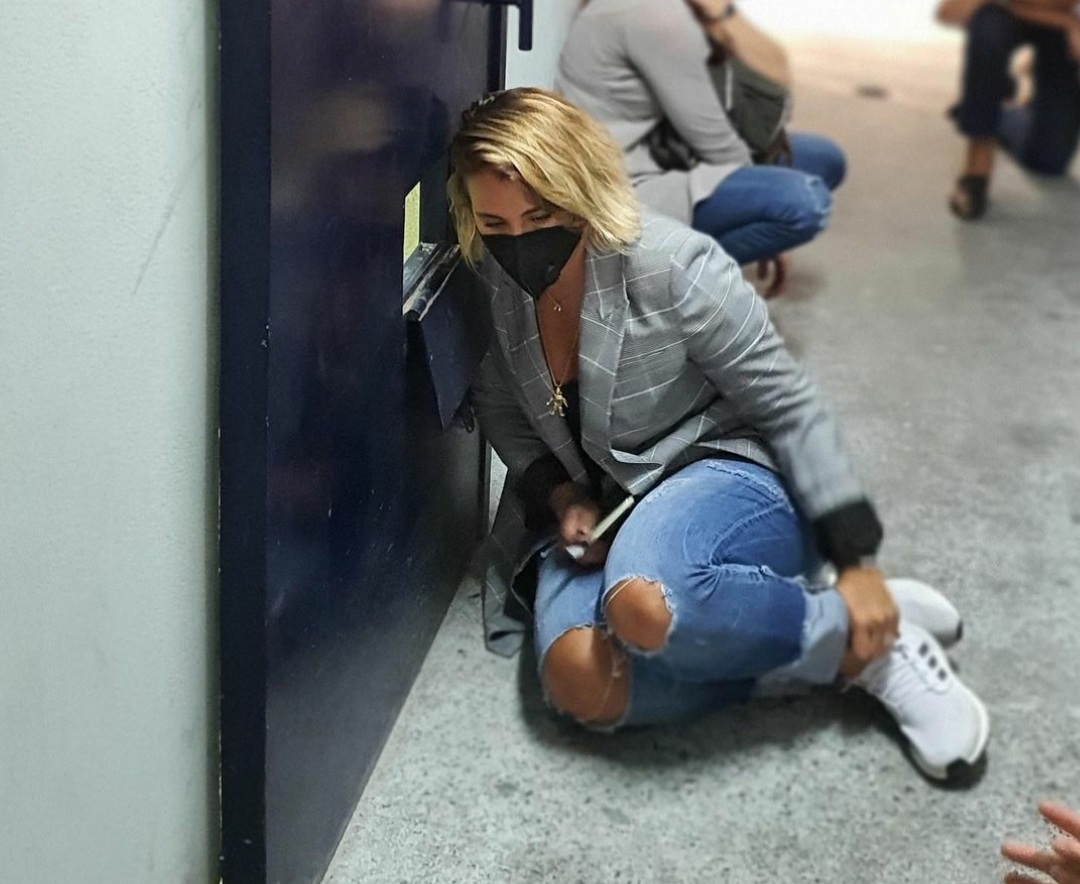
“Juzgamos muy fácil, hay que entender que detrás de cada persona, hay una historia que la hizo así”- Saskia Niño de Rivera
«We judge it very easy, we must understand that behind each person, there is a story that made it that way» – Saskia Niño de Rivera
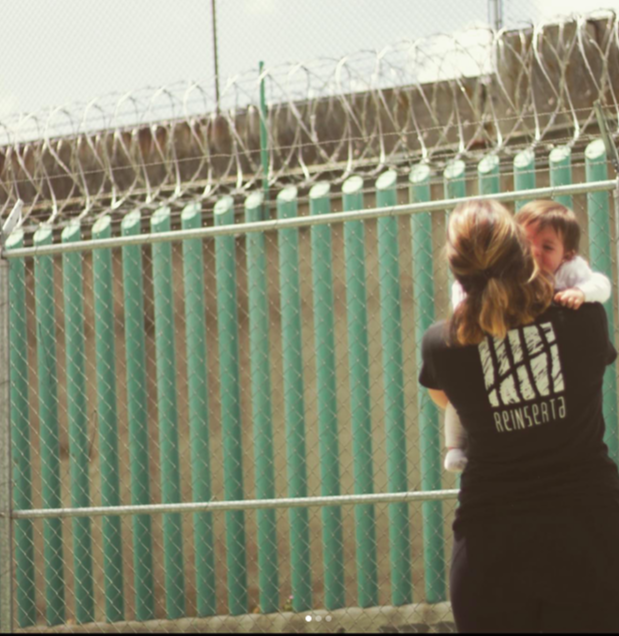

CONTEXTO GENERAL Y CONCLUSIÓN
GENERAL CONTEXT AND CONCLUSION
Lo que Ashley, Johana y Saskia hacen en las cárceles es un Modelo de intervención e impacto social. En Latinoamérica, uno de los orígenes del delito radica en las cárceles. Los problemas de sobre población (hasta 300%), el uso excesivo de la prisión preventiva (cientos de internos no tienen una sentencia condenatoria) y la corrupción al interior de los centros de reclusión y de los gobiernos hacen de éstos un semillero de delincuencia y violencia. Muchos estudios consideran que la fórmula para disminuir el índice delictivo de la región y mejorar la situación de seguridad es enfocarse en atacar el problema de fondo que es el contexto social que impulsa a las personas desde temprana edad a cometer un acto ilícito. En países donde más del 48% de la población se encuentran en estado de pobreza es necesario crear oportunidades reales para todos sus habitantes, por eso lo que estas tres mujeres, junto a sus fundaciones, ONG, su valentía y su empatía han logrado, de distintas maneras, cada una con su estilo, es tan importante y necesario, porque al dignificar la forma de vida de la población carcelaria, con proyectos sociales, de re-inserción, producción y sobre todo generando segundas oportunidades para personas que en su mayoría no han tenido ni la primera, logran cambiar uno de los problemas sociales de fondo, la injusticia.
Estoy segura que estas tres mujeres activistas se están dedicando desde lo mas profundo de su ser a cambiar las condiciones precarias de las personas privadas de libertad, que no solo se enfrentan a la des-humanización por sus difíciles condiciones en los centros penitenciarios, sino también a la des-humanización simbólica a través de los prejuicios y la estigmatización por parte de la sociedad.
What Ashley, Johana and Saskia do in prisons is a model of intervention and social impact. In Latin America, often the source of crime lies in the prisons themselves. The overcrowding (up to 300%), the excessive use of pretrial detention (hundreds of inmates do not have a conviction) and corruption within the prisons and the governments make them a hotbed of crime and violence . Many studies consider that the formula to reduce the crime rate in any region and improve the security situation is to focus on attacking the underlying problem that is the social context that drives people from an early age to commit illegal acts. In countries where more than 48% of the population are below the poverty line, it is necessary to create real opportunities for all its inhabitants. That is why these three women, and their foundations, with courage and empathy, have achieved in different ways and with their own personal style, important and necessary projects By dignifying the way of life of the prison population, with social projects, reintegration, production and above all generating second opportunities for people who, for the most part, have not had even the first, they manage to change one of the social problems of background, injustice.
I am sure that these three women activists are dedicating themselves from the depths of their being to change the precarious conditions of people deprived of liberty, who not only face dehumanization due to their difficult conditions in prisons, but also the symbolic dehumanization through prejudice and stigmatization by society.
Cito textualmente a Göran Therborn
“La desigualdad es una violación de la dignidad humana porque impide que todas las personas desarrollen sus capacidades. No es solo una cuestión de ingresos y riquezas: es un ordenamiento sociocultural que reduce nuestras capacidades de funcionar como seres humanos, nuestra salud, nuestro amor propio, nuestro sentido de la identidad, así como nuestros recursos para actuar y participar en el mundo”.
Quoting Göran Therborn “Inequality is a violation of human dignity because it prevents all people from developing their capacities. It is not just a question of income and wealth: it is a sociocultural order that reduces our capacities to function as human beings, our health, our self-esteem, our sense of identity, as well as our resources to act and participate in the world ”.
CREDITS
TEXT PIA BONILLA
By Ashley
https://linktr.ee/Ashleynguate
Johana Bahamón @johana_bahamón
By Johana
MADE IN PRISON
– Fundación Acción Interna @fundacionaccioninterna https://fundacionaccioninterna.org/
– Restaurante interno @restauranteinterno
– Segundas oportunidades @segundasoportunidades
#MadeinPrison #SegundasOportunidades #cárcelesproductivas
Saskia Niño de Rivera @saskianino
By Saskia
– Reinserta A.C @reinserta
https://hipgive.org/es
#LosNiñosDelNarco
